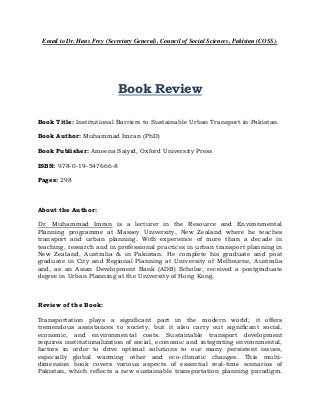
Institutional Barriers to Sustainable Urban Transport in Pakistan.
- 1. Email to Dr. Hans Frey (Secretary General), Council of Social Sciences, Pakistan (COSS). Book Review Book Title: Institutional Barriers to Sustainable Urban Transport in Pakistan. Book Author: Muhammad Imran (PhD) Book Publisher: Ameena Saiyid, Oxford University Press ISBN: 978-0-19-547666-8 Pages: 298 About the Author: Dr. Muhammad Imran is a lecturer in the Resource and Environmental Planning programme at Massey University, New Zealand where he teaches transport and urban planning. With experience of more than a decade in teaching, research and in professional practices in urban transport planning in New Zealand, Australia & in Pakistan. He complete his graduate and post graduate in City and Regional Planning at University of Melbourne, Australia and, as an Asian Development Bank (ADB) Scholar, received a postgraduate degree in Urban Planning at the University of Hong Kong. Review of the Book: Transportation plays a significant part in the modern world; it offers tremendous assistances to society, but it also carry out significant social, economic, and environmental costs. Sustainable transport development requires institutionalization of social, economic and integrating environmental, factors in order to drive optimal solutions to our many persistent issues, especially global warming other and eco-climatic changes. This multidimension book covers various aspects of essential real-time scenarios of Pakistan, which reflects a new sustainable transportation planning paradigm.
- 2. It discuss the various periods of policies and explores the models of sustainable development and viable transportation, defines practical practices for comprehensive evaluation, provides tools for multi-modal transport planning, and presents innovative mobility management solutions to transportation problems. Books also picture the present urban transport in Pakistan that is managed by building wider and improved roads. By contrast the doctrines of sustainable urban transport embolden the practice of non-motorized and public transport. These approaches of transport can be more efficacious in highly populated Pakistani cities, but the direction of transport policy is in the opposite direction: towards heavy investment only in roads. The study of transport institutions in Pakistan indicates that transport solutions are mainly a matter of the trade of knowledge from the developed to the developing world. This results in an incongruity of transport policy with local needs for mobility and safety, as well as economical, sociological & ecological sustainability. The concept of path dependence is developed to explore how urban transport solutions in Pakistan become locked-in overtime as a result of past decisions on infrastructure investment, funding priorities, organizational structure, specific techniques and mental models of international and local institutions. This book identifies organizations, procedures & discourse fields in path dependence as barriers to sustainable urban transport in Pakistan and proposed building the policy capacity of local institutions for institutional change in Pakistani cities. Government Policymakers, transporters, students of various disciplines, planners, and concerned citizens will find many of its stimulating concepts and approaches of considerable value as they engage in the processes of understanding and altering transportation towards better sustainability. This book imitates a fundamental transformation in transportation decision making. It emphases on accessibility rather than mobility, emphasizes the need to increase the range of options and influences considered in analysis, and delivers practical tools to allow students, government’s policy makers, planners, and the general public to define the best solution to the transportation problems facing a public. The complexity of transportation systems and their negative social and environmental effects are today at the center of attention. This book focuses on the impact of institutions and regulatory systems on transport systems and travel behavior. While institutions appear to play an important role in the economic success of many countries, this book considers the extent to which they also support sustainable development. This book presents an investigation of the institutional barriers averting the development of a new image for urban transport compatible with these authenticities and in those terms 'sustainable'. Representing various case
- 3. studies to understanding transport policy, this book brings sophisticated political-institutional analysis to what has traditionally been the domain of engineering and technology. The text takes readers through each and every mode of transport, beginning with human-powered modes and ending in motorized modes, including marine and air transport. The modes are analyzed separately and in comparison with others according to several criteria: Capacity/utility/functionality considerations; infrastructure demands; resource consumption; land use considerations; pollution; and costs. In ways that non-technically trained readers as well as planning students professionals can find useful the book includes guidance on how to optimize transportation systems; balancing economic, social and environmental objectives while creating just, robust, and diverse, rather than one-size-fits-all, solutions. The modes are grouped and compared within their respective contexts, and there is vital discussion and differentiation between passenger and freight-goods transport. The final section develops a comprehensive summary of the previous chapters and develops arguments for sustainable transportation policymaking and integrated planning, providing international examples and case studies and extracting from them general applications for integrated sustainable transportation.
